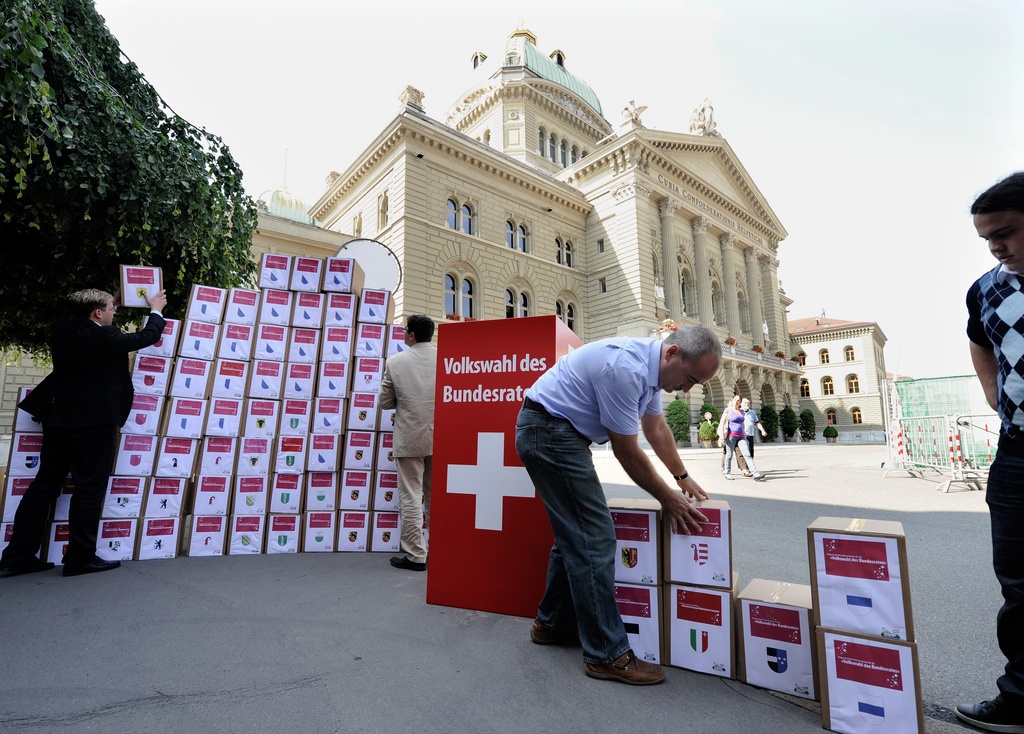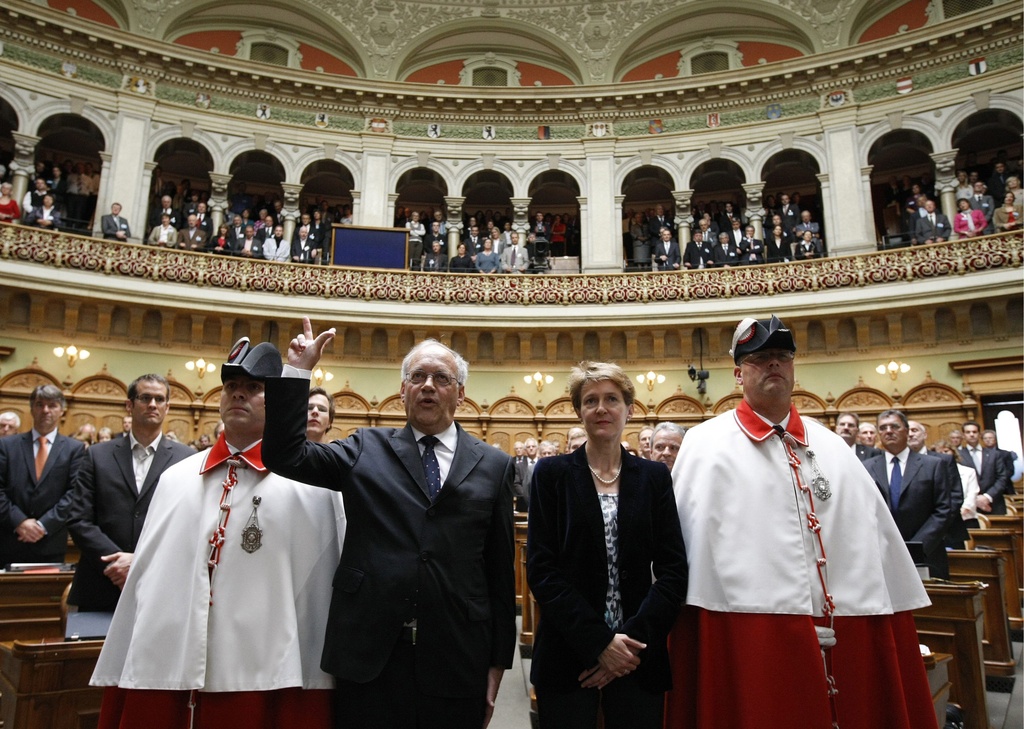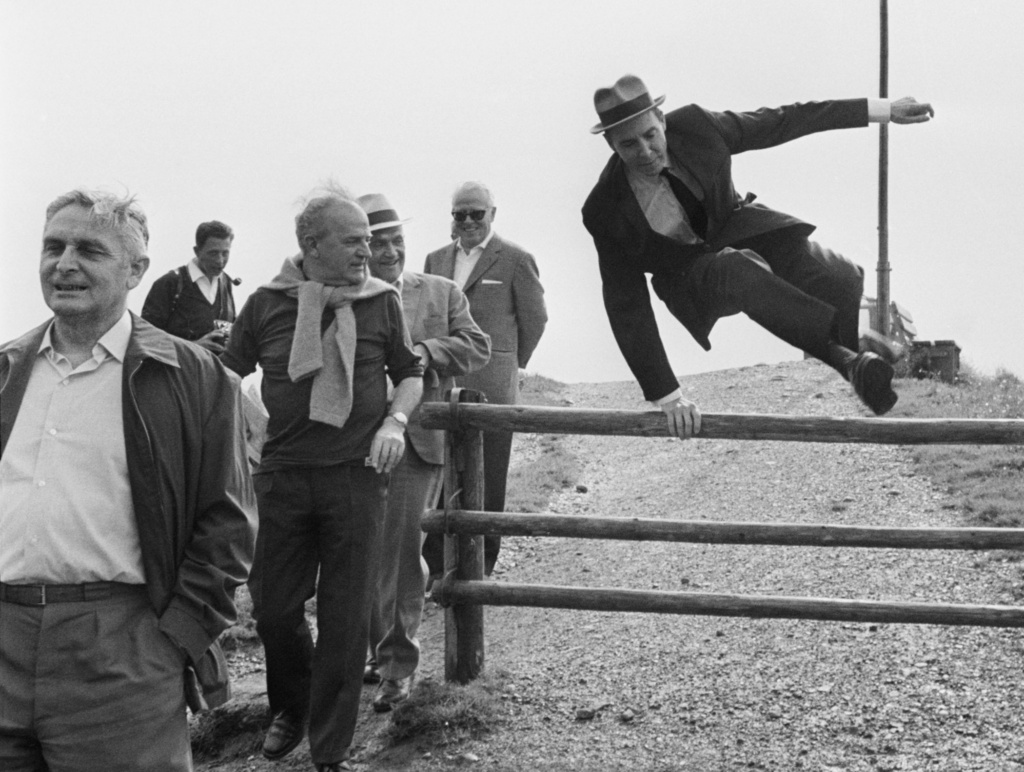Voters to decide on cabinet election reform

An initiative aimed at limiting parliament’s powers and letting citizens select members of the Swiss cabinet has collected enough signatures to force a nationwide vote.
The proposal, launched by members of the rightwing Swiss People’s Party, also has its supporters among the centre-left. Opinions among political scientists are divided.
Just over 110,000 signatures in support of the initiative were handed in by campaigners to the Federal Chancellery on Thursday.
People’s Party President Toni Brunner said if voters accepted the initiative it would represent the “completion of Switzerland’s direct democracy”.
“If they are elected by the people they are responsible to the people,” Brunner added.
However, the campaign to collect the necessary number of signatures was not exactly a smooth ride. It took almost the statutory 18 months for proponents to ascertain that they had won enough support.
There is obvious scepticism within the People’s Party as to whether the initiative will help the rightwing group. Several of its parliamentarians have publicly questioned the benefits of the proposal.
The party has presently one seat in the seven-strong cabinet, following the non-election by parliament of Justice Minister Christoph Blocher in 2007 and the subsequent internal row with members of the party’s more moderate wing.
But it is the largest group in the House of Representatives – the bigger of the two parliamentary chambers – winning 29 per cent of the vote in 2007, nearly ten per cent more than rival parties.
Competent
Andreas Auer, law professor at Zurich University and co-head of the Research Centre on Direct Democracy, is a long-time advocate of the direct election of cabinet members by voters.
“It is a justified and necessary proposal. But it should be part of a general review of the system of government and not a pretext to firm up a formula that has long lost its magic,” he said in an article published in the Neue Zürcher Zeitung newspaper.
He says citizens are perfectly capable of choosing candidates to a functioning cabinet which represents the linguistic and cultural diversity of the country.
Allegations to the contrary, he adds, fly in the face of reality.
In the system of direct democracy Swiss voters have the final say on “the most complex issues”, Auer says.
Campaigning
Daniel Kübler, his colleague at the Aarau-based research institute, takes a different view.
“The initiative does not solve any problems. On the contrary it makes them even worse,” said Kübler, professor of political science at Zurich University.
He believes that an election by voters instead of parliament would unnecessarily destabilise the system, and individual cabinet ministers might be tempted to campaign all year round.
“In short: they would govern on Wednesdays – the day of the regular cabinet meetings – but spend the rest of the week trying to raise their personal profile in public.”
Far from ignoring the shortcomings of the present political system, Kübler says reforms are necessary to boost the cabinet’s democratic legitimacy.
He suggests boosting parliament’s control of the cabinet, a stronger role for the rotating one-year presidency, and increasing the number of state secretaries, instead of promoting populist and American-style policies.

More
People’s initiative
Populist
Daniel Bochsler, assistant professor at Zurich University’s department for political sciences, takes the middle ground.
“The initiative neither improves the quality of democracy, nor does it really give citizens a greater say in politics,” Bochsler said.
“And it does not turn the political system upside down.”
He believes that the People’s Party has no real interest in its own proposal. “They are using the initiative to exert pressure and try to intimidate rival parties.”
Bochsler argues that the Swiss system, based on consensus-seeking and compromise, has broad support among the people.
But election of government ministers by the people could work, as direct elections to the governments of the 26 cantons prove.
“Voters appear to appreciate political consensus. They want the parties to present candidates ready to make compromises. Controversial politicians such as People’s Party figurehead Blocher would be highly unlikely to win enough backing from citizens,” said Bochsler.
If opinion polls are anything to go by, the election of cabinet members by voters faces an uphill battle to win a majority.
An online survey carried out in February found only 40 per cent of respondents in favour of the initiative.
Under the Swiss political system it is up to parliament to elect individual members of the seven-strong cabinet.
In the wake of parliamentary elections, the entire cabinet has to win the endorsement of the House of Representatives and the Senate for a four-year term.
The government cannot be brought down by no-confidence votes and there is no impeachment procedure. Cabinet members are free to decide themselves on their resignation.
The cabinet is not bound by a formal coalition agreement between the different political parties.
Based largely on voter support at the ballot box, the four main parties shared out the seats for more than 40 years under an informal agreement, known as the Magic Formula.
But in 2003 the People’s Party won a second seat at the expense of the centre-right Christian Democratic Party before it lost it again to the Conservative Democrats four years later.
The cabinet is currently made up of two representatives each of the centre-right Radicals and the centre-left Social Democrats. The remaining three seats are shared by the centre-right Christian Democrats, the rightwing Swiss People’s Party and the Conservative Democrats.
The initiative was launched in December 2009 and campaigners handed in about 110,000 signatures to force a nationwide ballot.
No date has been set for the vote. It is expected to take place around 2014/15.
Two previous votes on the issue, launched by the political left, were rejected in nationwide ballots in 1900 and 1942.

In compliance with the JTI standards
More: SWI swissinfo.ch certified by the Journalism Trust Initiative













You can find an overview of ongoing debates with our journalists here . Please join us!
If you want to start a conversation about a topic raised in this article or want to report factual errors, email us at english@swissinfo.ch.